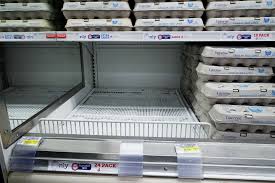In a concerning development, the Connecticut Department of Agriculture has confirmed the presence of H5N1 avian influenza, commonly known as bird flu, in a backyard flock in New Haven County. This marks the first confirmed detection of bird flu in the region this year, potentially setting the stage for a series of health and economic challenges.
The bird flu virus, which is highly contagious among birds, can also affect other animals like cows. While it doesn’t typically affect humans directly, people who come into contact with infected animals or their contaminated environments are at risk, according to the Centers for Disease Control and Prevention (CDC).
A Persistent Problem
The H5N1 strain of bird flu, which was first detected in the U.S. in 2024, continues to spread rapidly. While previous strains have typically lasted for a few months and disappeared, this one has had an unusual staying power, impacting not just birds but other animals as well. Kimberly Rollins, a professor of agricultural economics at the University of Connecticut, notes that the virus has not behaved as expected, continuing for years instead of disappearing like previous strains.
Typically, avian influenza outbreaks last for a season and then fade away. However, Rollins points out that the ongoing nature of the current outbreak is raising alarms. “This is different from what we’ve seen before,” Rollins explains. “It didn’t do the thing that it normally does, where it disappears for several years before returning. This has been ongoing for a couple of years now.”
A Growing Threat to Human Health
Bird flu is spread through bodily fluids such as saliva, feces, or eggs from infected animals. While pasteurized milk and properly cooked eggs are safe for human consumption, people who come into direct contact with infected animals or contaminated environments are at risk of contracting the virus.
The first confirmed human case of the H5N1 bird flu in the U.S. occurred in April 2024, highlighting the potential danger the virus poses to public health. However, experts say the virus has not yet been transmitted directly from person to person. The CDC has emphasized that proper handling of eggs and milk can prevent infection, but people should be cautious when handling poultry or any products that may be contaminated.
Economic Fallout: Egg Shortages and Skyrocketing Prices
Beyond the health risks, the ongoing bird flu outbreak is having a significant impact on the U.S. economy. The egg industry, already struggling with supply chain disruptions, is facing additional pressure as bird flu continues to spread. Suppliers are being forced to reduce production, which is leading to shortages across the country.
As demand for eggs remains high, the limited supply has caused prices to soar. According to ABC News, egg prices have skyrocketed as producers are forced to cut back on their output. Experts predict that egg prices could increase by as much as 20% this year, with the bird flu epidemic being one of the primary drivers behind the rise.
“This is pretty serious. You can imagine that as the flocks get smaller and smaller in number, the demand is pretty much the same, but the supply is getting tighter and tighter,” Rollins explains. “As the supply shrinks, prices inevitably go up.”
The effects of the egg shortage are being felt not just by consumers but also by restaurants. Popular establishments such as Waffle House are now charging a surcharge on egg dishes, with some adding an additional $0.50 to the price of meals that include eggs. According to NBC News, these price hikes are becoming more common across the industry as the impact of the bird flu crisis grows.
A Future of Rising Costs
As the bird flu outbreak continues to spread, the U.S. faces uncertain economic challenges. While the health risks of the virus are being carefully monitored, the rising cost of eggs and other poultry products is becoming a real concern for families, businesses, and consumers alike.
Experts, like Rollins, are urging people to pay attention to the situation and take necessary precautions when handling food products, particularly eggs and poultry. As the supply of eggs dwindles, it seems the only thing that’s certain is that prices will continue to rise.
Disclaimer – Our team has carefully fact-checked this article to make sure it’s accurate and free from any misinformation. We’re dedicated to keeping our content honest and reliable for our readers.








